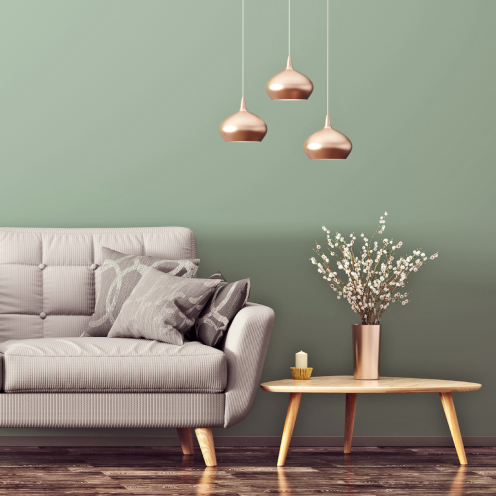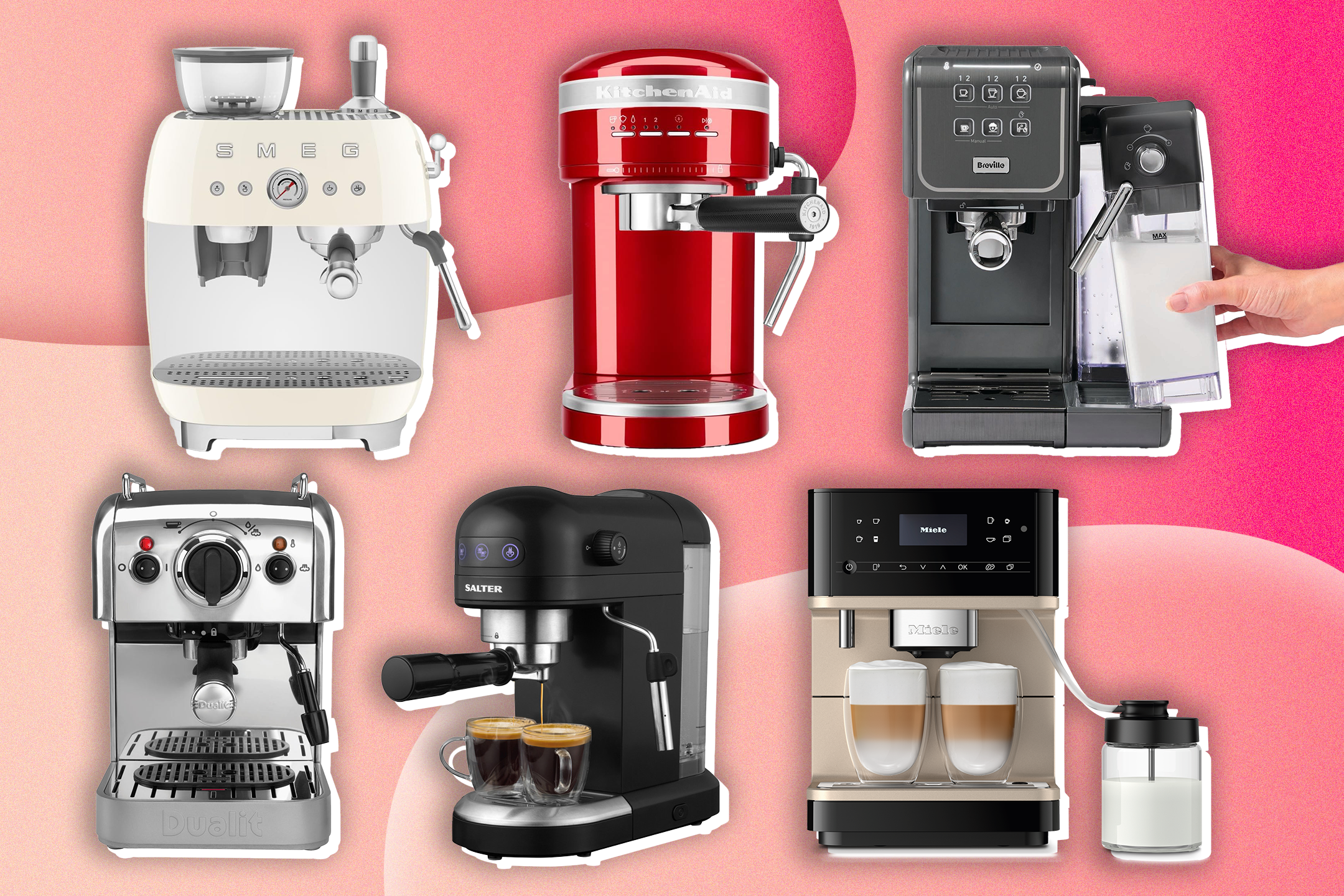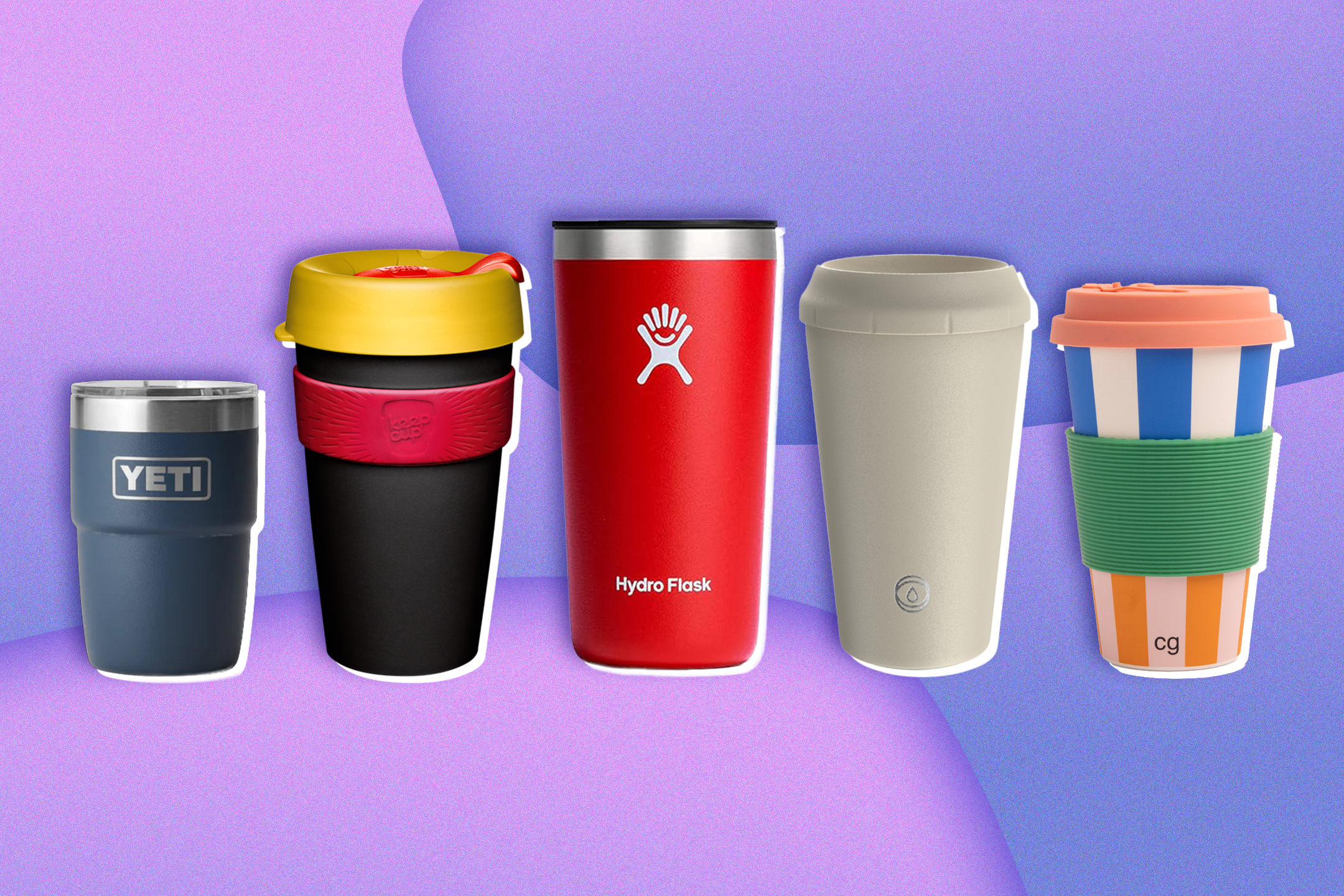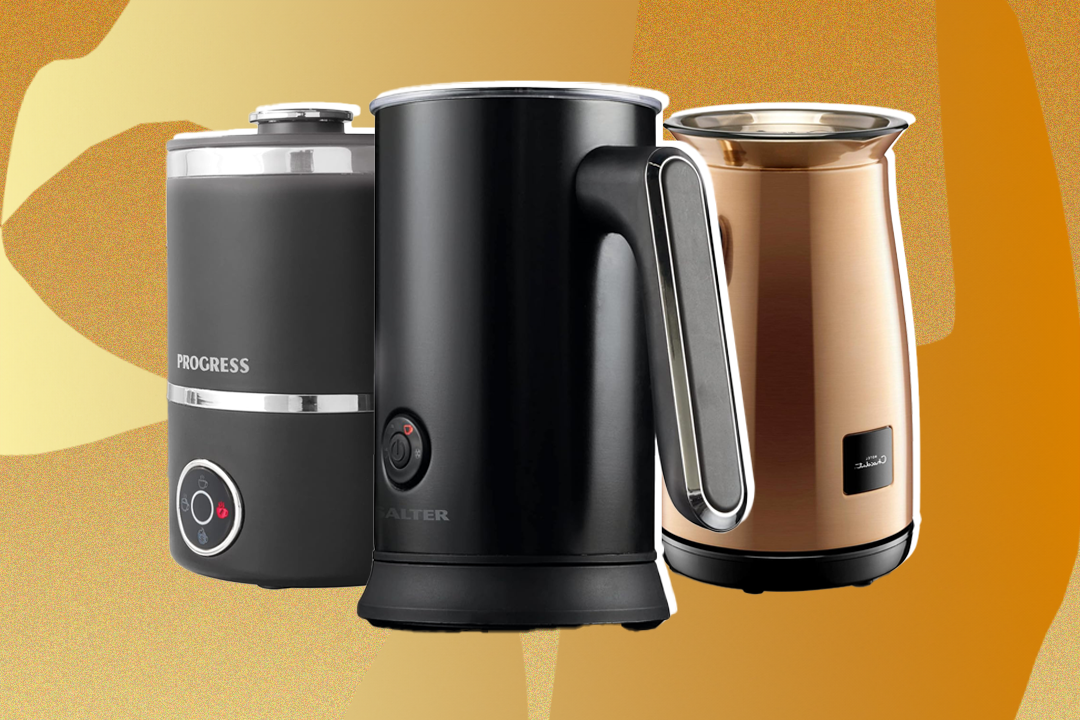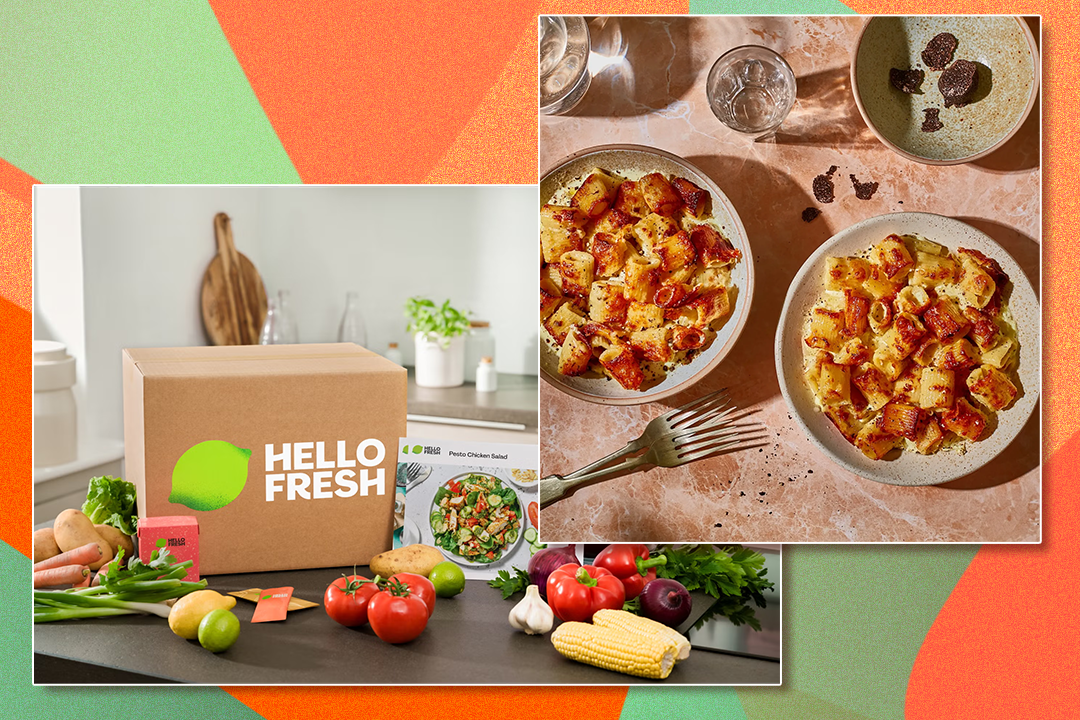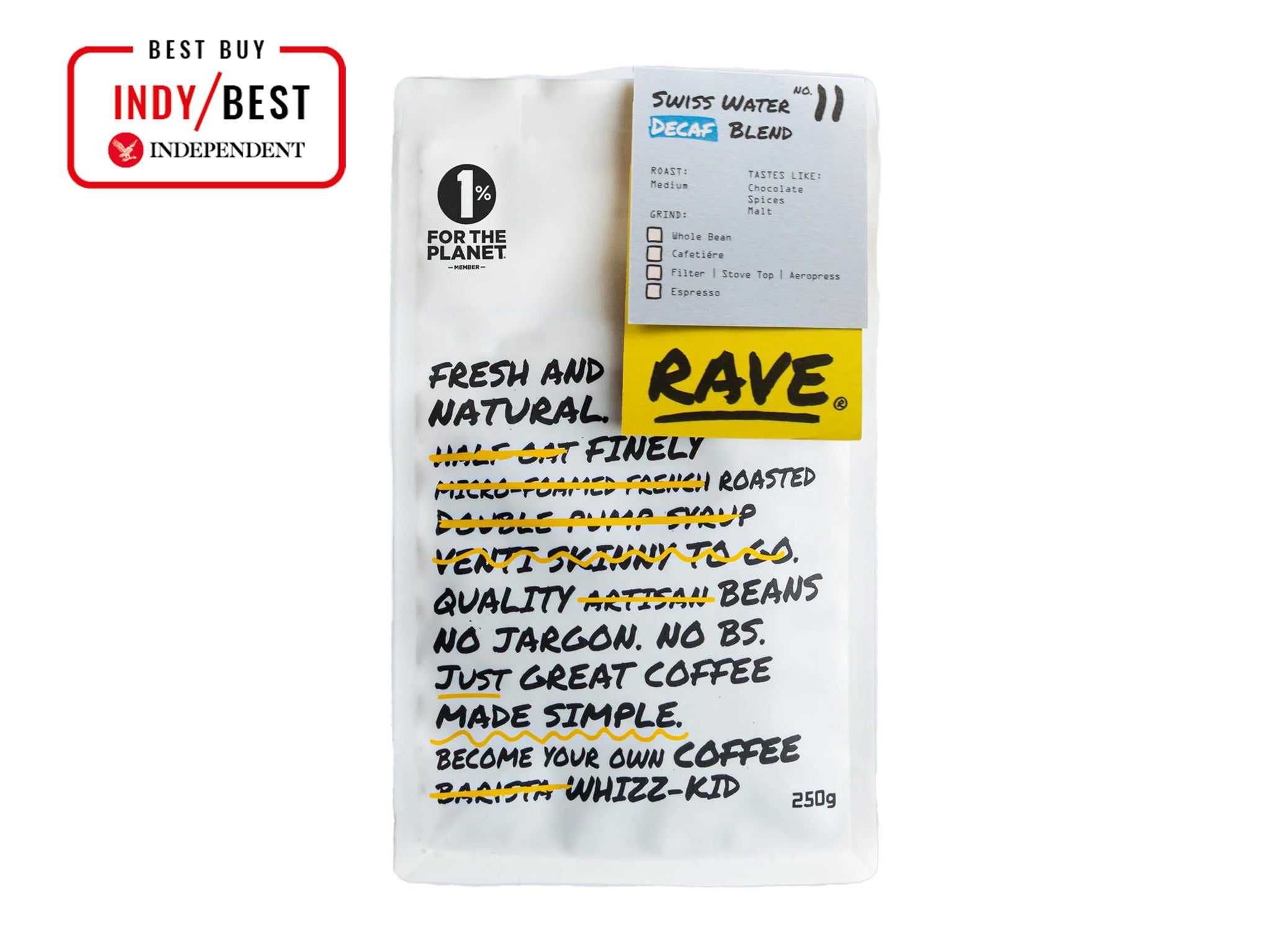
The Independent's journalism is supported by our readers. When you purchase through links on our site, we may earn commission. Why trust us?
12 best decaf coffees for serious flavour without the buzz
These are the whole bean, ground and instant joes that came out on top
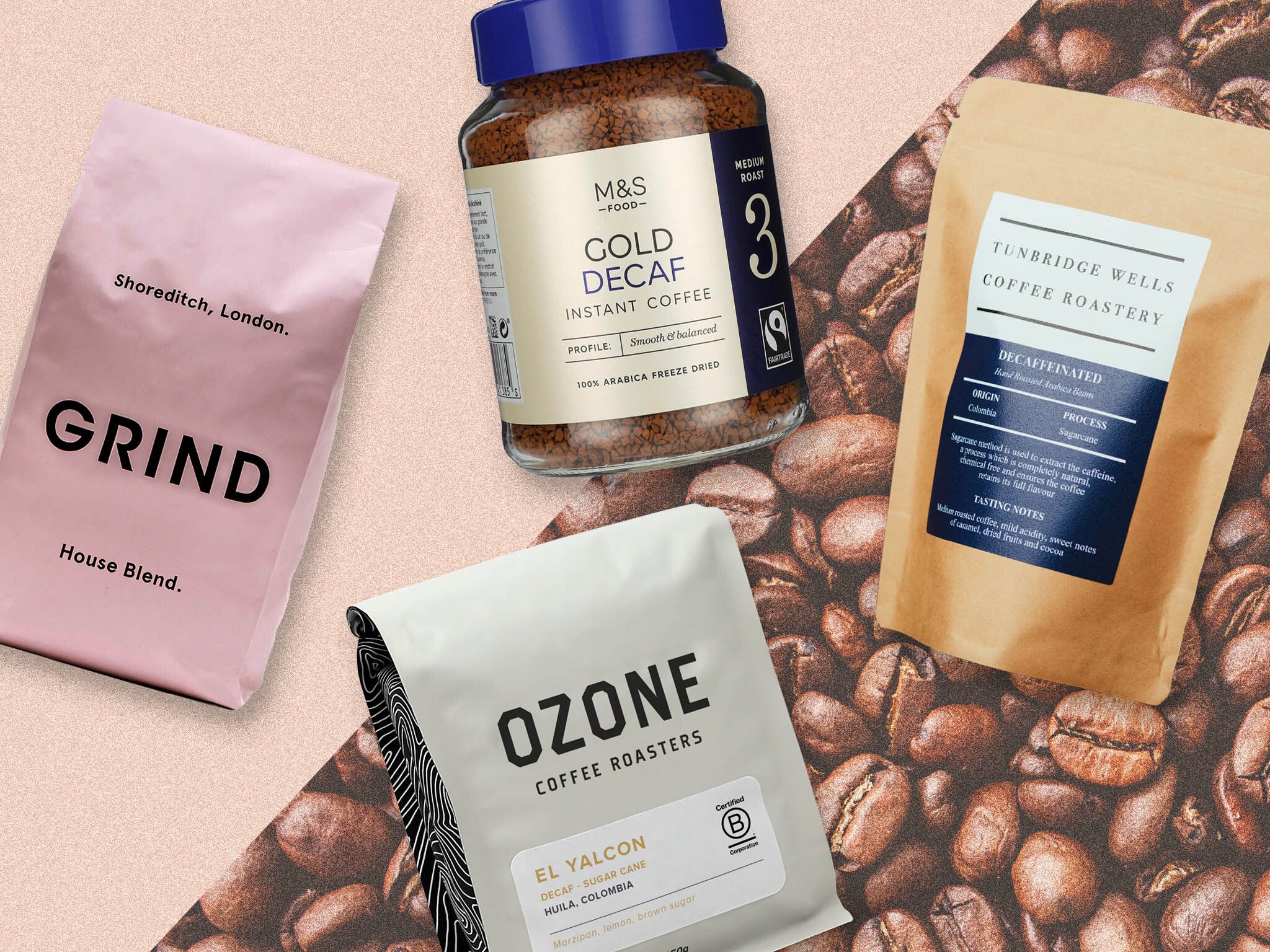
Love the taste of coffee but can’t tolerate caffeine? A good decaf coffee can give you that delicious full-bodied flavour without keeping you up all night. For too long, coffee snobs have turned their noses up at decaf, but a range of small and big brands are showing it’s perfectly possible to have a decent cup of caffeine-free coffee.
Pregnant and breastfeeding women are advised by the NHS to avoid caffeine, and other people with medical conditions might be advised to avoid it too. Some find the effects of caffeine just don’t agree with them. You might feel anxious, have a racing heart or find it hard to fall asleep, or even experience digestive issues if you’re hypersensitive to caffeine.
Decaf coffee is made from the same coffee beans as regular coffee, but it’s gone through extra processes to remove the caffeine. It’s worth bearing in mind that even decaffeinated coffee has traces of caffeine and how much varies from blend to blend. There are also half caf and low caf options for those who want a smidge of caffeine without feeling like they need to scrape themselves off the ceiling.
There are five different ways coffee producers remove caffeine from the coffee, which are direct solvent, indirect solvent, Swiss water, sugarcane and carbon dioxide processes. The first two use chemicals to remove caffeine. The Swiss – sometimes called “mountain”– water process sees beans steamed and then soaked, filtered through charcoal and then dried. Finally, the sugarcane process uses a natural chemical from sugarcane to remove caffeine and provides a sweeter taste, while the carbon dioxide method involves soaking the beans and then blitzing them with CO2. So, now that we’re clued up on the technical bits, onto our favourite caffeine-free coffees for a brew without the buzz.
How we tested
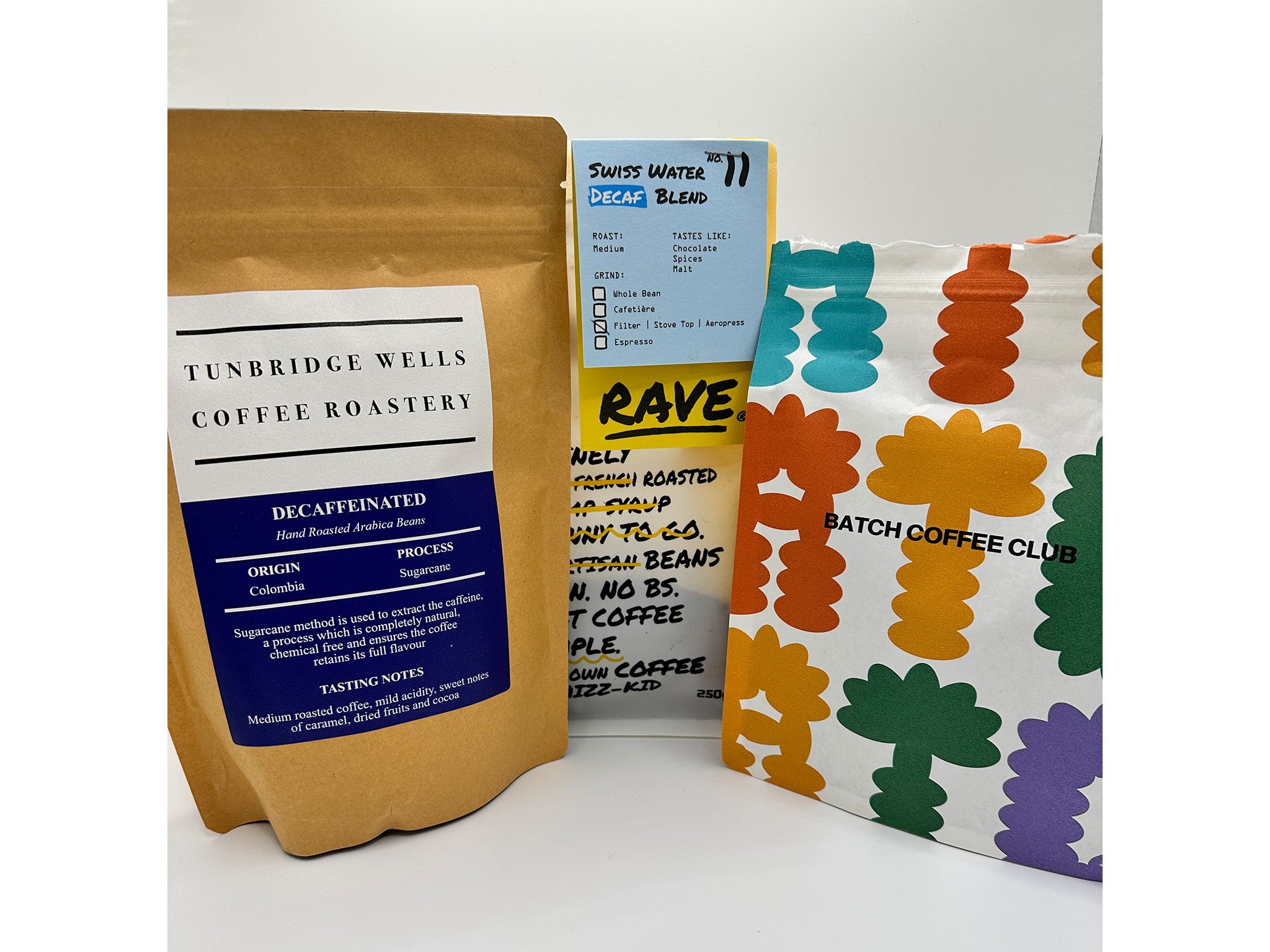
While we’ve officially spent two years taste-testing decaf coffees to find the best, our tester has been drinking caffeine-free coffee for eight years. Along with our expertise, we invited a group of hardened coffee drinkers into the challenge. We tested ground beans in an aeropress and whole beans in one of the best bean-to-cup coffee machines on the market. We tasted them both with and without milk – and even tried dairy-free alternatives to see how they changed the flavour profile. We’re nothing if not thorough.
Why you can trust us
When it came to choosing the right expert for this review, Zoë Phillimore was a natural candidate. As a freelance journalist and editor who has been contributing to IndyBest’s reviews since 2021, she specialises in topics spanning home interiors and appliances as well as parenting and kids’ products. While Zoë has long been a decaf coffee convert, over the past couple of years she’s become somewhat of a connoisseur and has used her bank of coffee expertise and personal preferences to steer her selection of the coffees below.
The best decaf coffees for 2025 are:
- Best overall – Rave Coffee Swiss water decaf no. 11: £7.85, Ravecoffee.co.uk
- Best budget buy – Marks and Spencer gold decaf instant coffee: £3.40, Ocado.com
- Best Instant coffee –Nescafe Azera decaff americano instant: £3.85, Coop.co.uk
- Best for black coffee drinkers – Grind decaf blend coffee: £8, Grind.co.uk
- Best coffee pods – Nespresso ristretto decaffeinato: £4.50, Nespresso.com
Rave Coffee Swiss water decaf no. 11

- Best: Overall
- Method: Swiss water
- Origin: Unspecified
- Why we love it
- Tastes great
- Good crowdpleaser
- Nice packing
- Available in plenty of formats
When we were testing this coffee, everyone who tried it let out a “mmm” sound – even those who are coffee aficionados. Because of this huge seal of approval, we’ve made it our best decaf coffee overall. The medium roast produces a mid-bodied coffee, that’s perfect to drink at any time of day. Yet it doesn’t lack flavour, with a rich spiced chocolate taste. We reckon you’d be able to pass off this decaf coffee as the caffeinated stuff, on flavour at least. While it’s not about packaging, we also enjoyed Rave’s brightly coloured bags and the tasting note card that came with it. Rave offers whole bean or ground for cafetiere, espresso or filter/aeropress.
Marks and Spencer gold decaf instant coffee
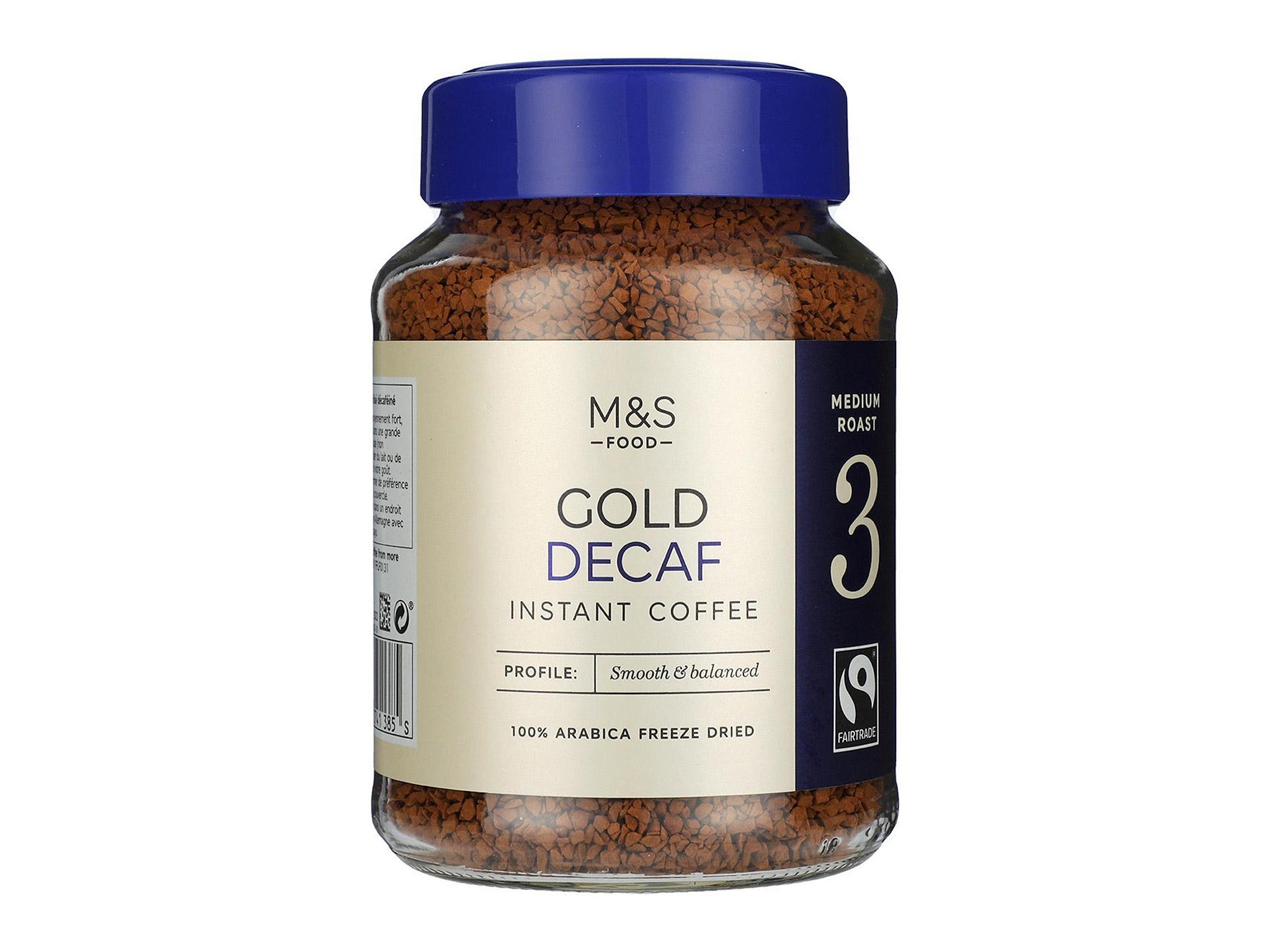
- Best: Budget buy
- Method: N/A
- Origin: Unspecified
- Why we love it
- Easy to make
- Gentle flavour
- Take note
- Coffee snobs best look elsewhere
Look, no judgement here. Sometimes you just need a quick coffee hit and can’t be doing with machines and scoops and water temperatures. For those occasions, good old M&S has come up trumps. This is a medium roast coffee, so it’s not going to blow you away with a rich, full body but neither is it going to be watery and light enough that “you might as well have made tea”. The perfect balance, if you will. The coffee is smooth. Is it going to set discerning palates alight? Probably not. But we did find ourselves reaching for it as convenience over other instant decaf coffees. Another plus point is that it’s Fairtrade certified.
Tunbridge Wells Coffee Roastery decaf coffee
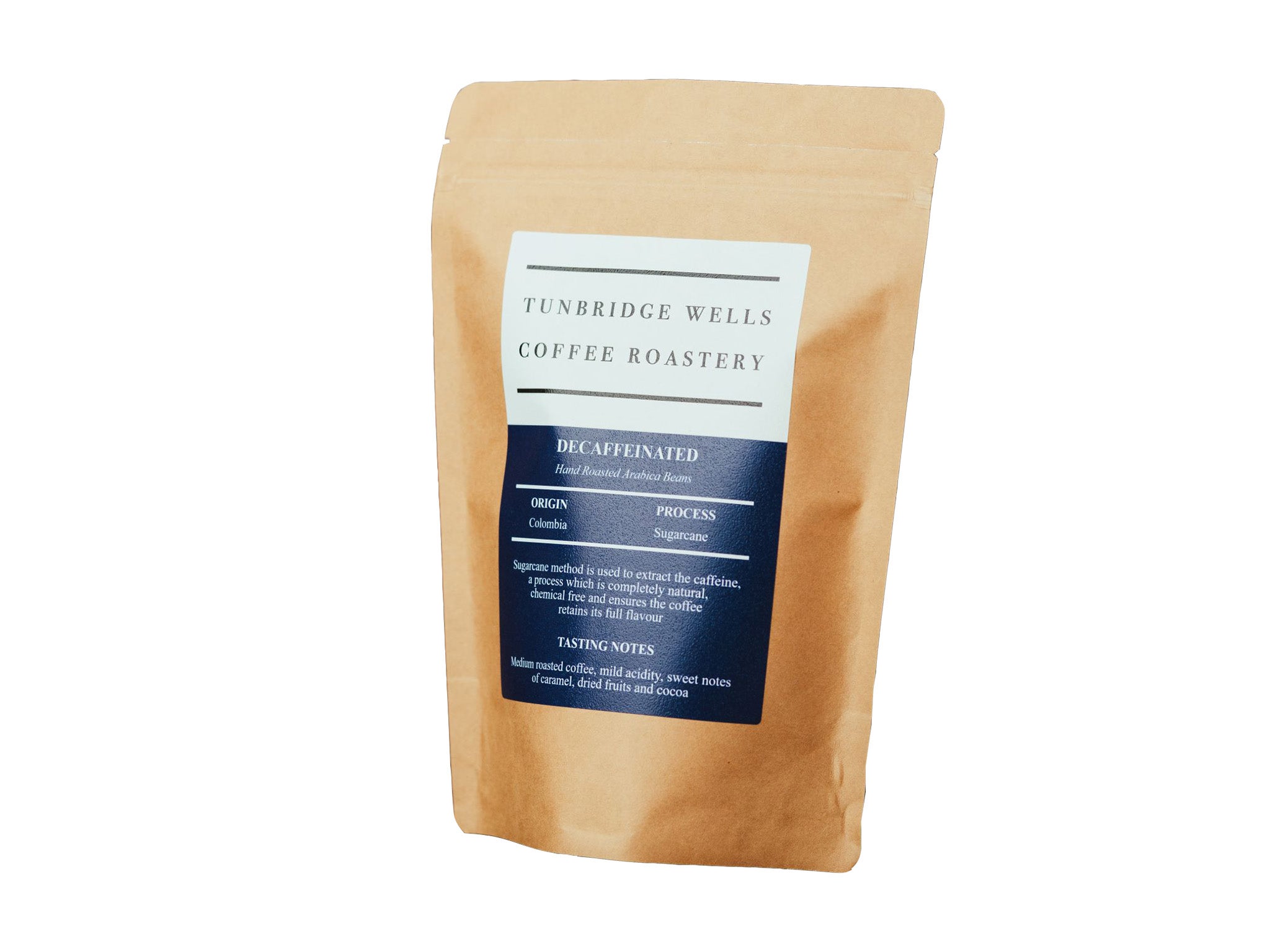
- Best: Medium roast
- Method: Sugarcane
- Origin: Colombia
- Why we love it
- Made by small
- Independent business
- Good for subtle sweetness
- Rich flavour
This small roastery in Kent only started out in 2019 but has been making waves in the coffee world. Its decaf coffee is delicious. Made using the sugarcane method, there’s gentle sweetness to the flavour. As it’s a medium-dark roast coffee there is a full flavour and aroma without too much bitterness. Our tasters noted it had a good “tang” and was rounded and smooth. We reckon this makes a great everyday coffee and find it the ideal replacement for the caffeinated stuff first thing in the morning.
This coffee is available as whole beans or ground for cafetiere, filter or espresso machines.
Ozone Coffee el yalcon decaf
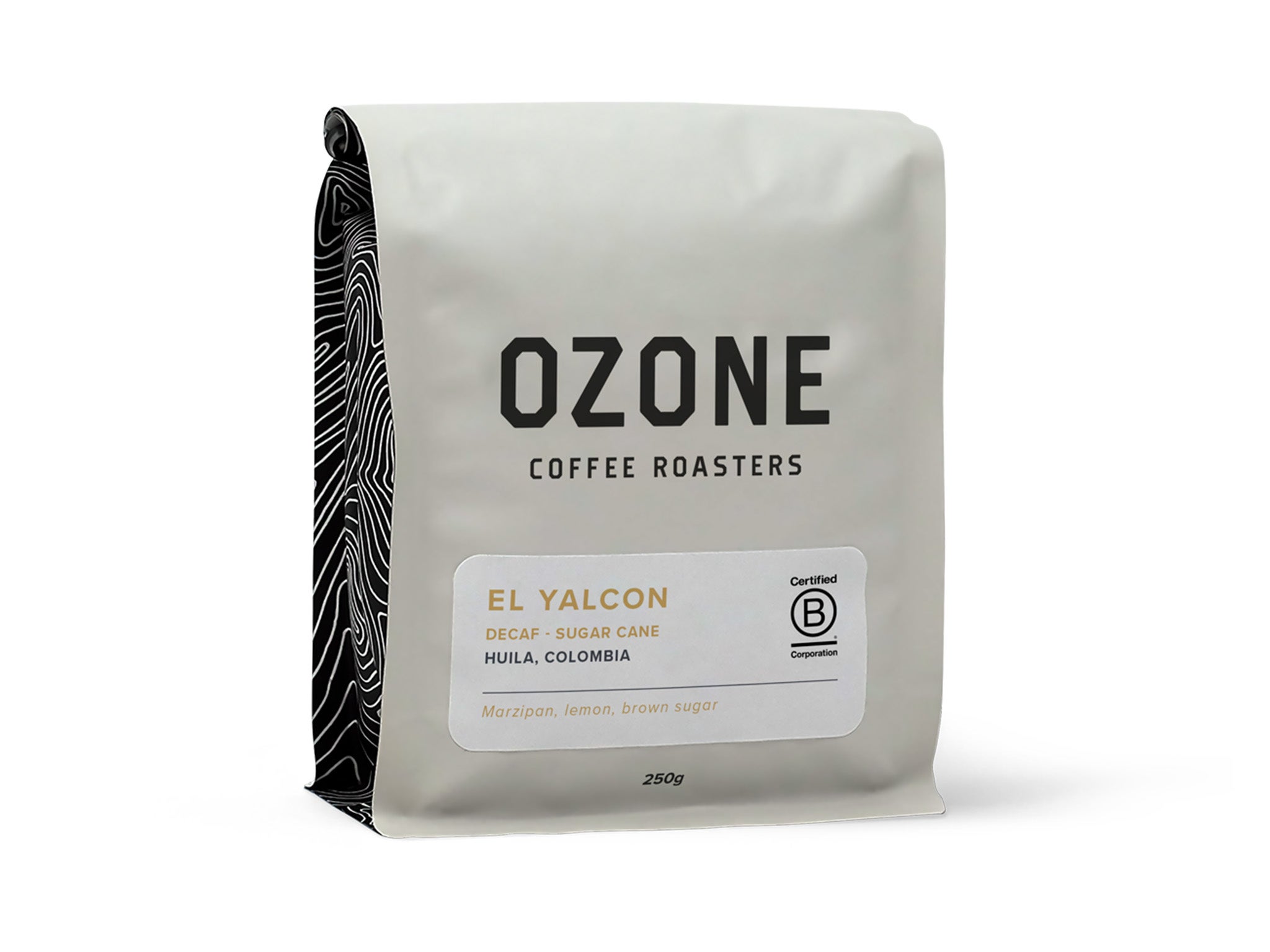
- Best: Full-bodied coffee
- Method: Sugarcane
- Origin: Colombia
- Why we love it
- Great for those who want a real coffee hit
- Certified B Corporation
- Comes in plenty of formats
- Take note
- Flavour might be too strong for some
Ozone is a big name in high-end coffee. This is its decaf offering, which doesn’t compromise anything on the flavour. It’s a very rich coffee, with a nutty molasses flavour that lingers and quite a heavy body. This Ozone coffee is absolutely one for those who deeply miss a huge coffee flavour hit. While in the morning we found this coffee too much of a sucker punch for us, it was perfect as an after-dinner coffee or in a decaf espresso Martini. With Ozone, you can select your grind to whatever device you use to make your coffee. It’s heartening to see Ozone is a Certified B Corporation, meaning it’s looking out for the people who make its coffee, and the planet as a whole.
Batch decaf coffee subscription
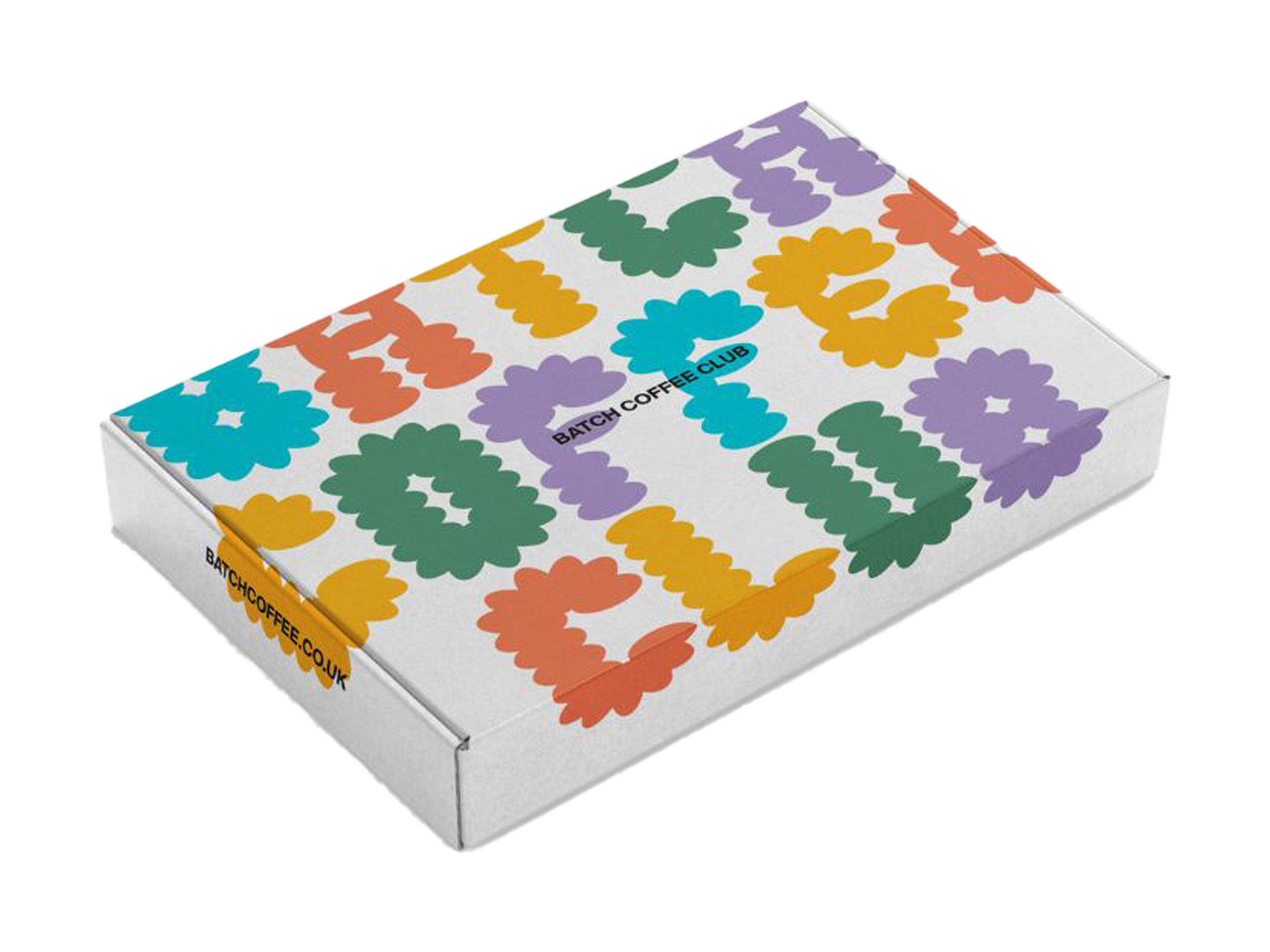
- Best: Coffee subscription
- Method: Mountain water
- Origin: Mexico
- Why we love it
- Fun idea
- Great as a gift
If you love your coffee and want to keep things interesting, Batch coffee offers a coffee subscription service that has a decaf option. This means you’ll get different decaf coffees sent to you from independent UK roasters. In our box, we got Groundstate hipster Stan coffee (Groundstated8.com). Groundstate was set up by a scientist and a yogi – we love a good backstory – and it buys rare lots of single-origin coffee. This particular bean is grown in an organic biosphere reserve in Mexico. It’s a really interesting coffee, with heady flavours of chocolate and raisins. We reckon this subscription would be a wonderful gift for an adventurous fan of decaf coffee.
Grind decaf blend coffee
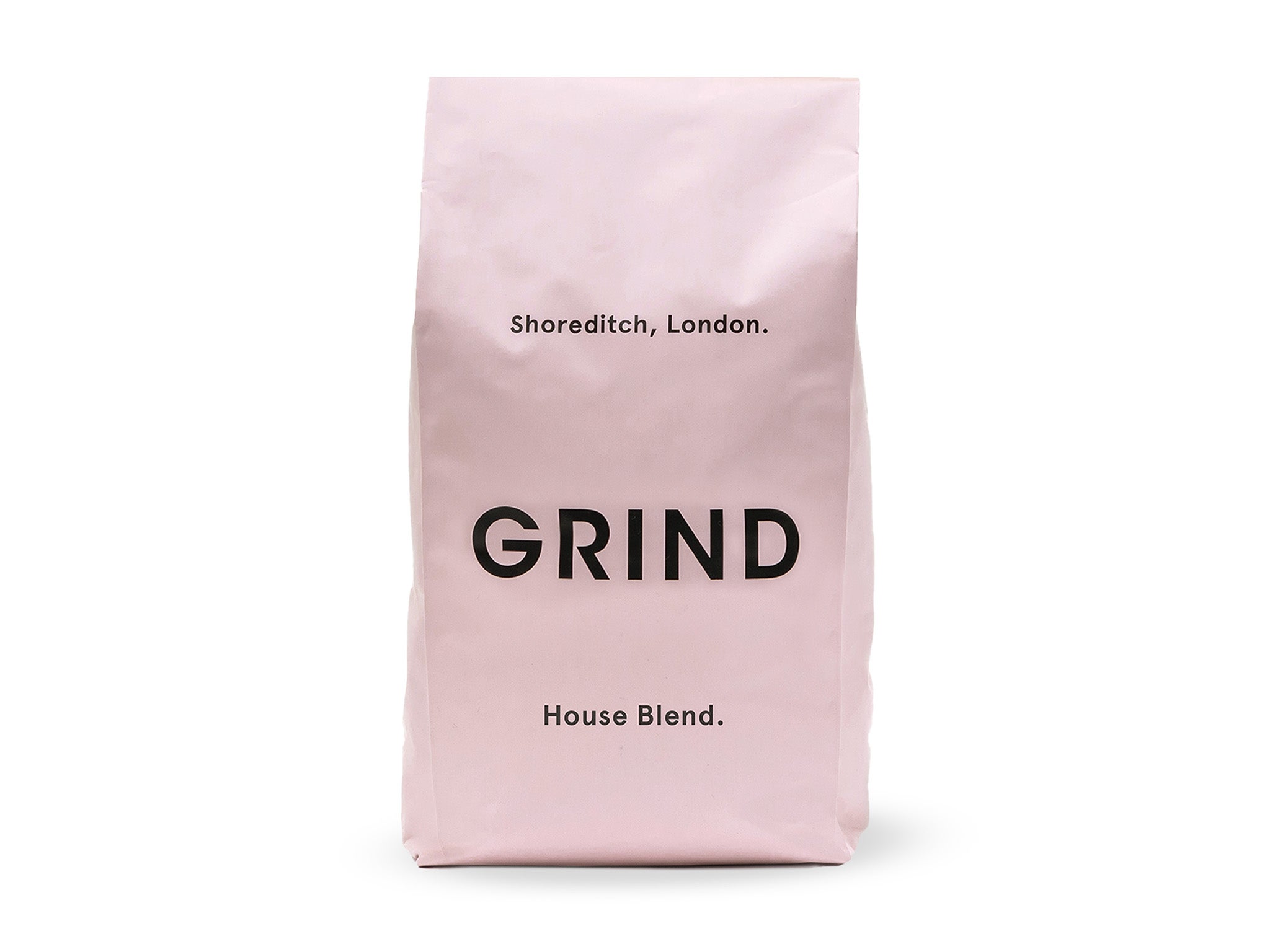
- Best: For black coffee drinkers
- Method: Mountain water
- Origin: Mexico
- Why we love it
- Super zingy flavour
- Great for black-coffee lovers
- Cute tin
- Comes in loads of formats
With a dark-chocolate tang, we had to double check whether this coffee was definitely decaf. There is also a sharp plum-like acidity to it, which created a rich and interesting taste. It’s a mid-roast blend, designed to be taken black or it can take milk too. Grind’s coffees are sustainably sourced, come in compostable bags and with a free coffee tin. You can also subscribe to deliveries or order as a one off, plus you can get them in coffee pods or as whole bean or ground.
Perky Blenders decaf
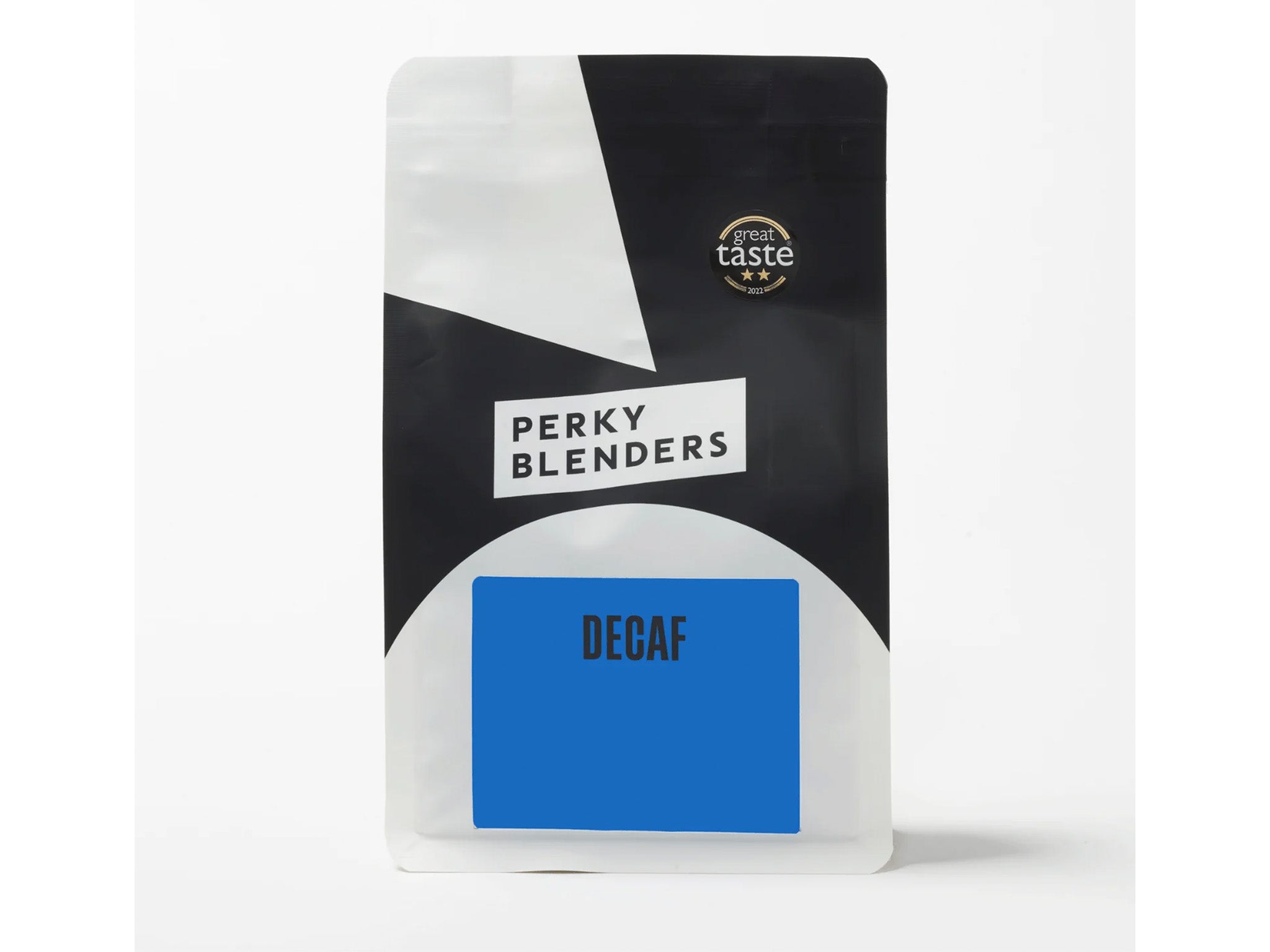
- Best: Lighter coffee
- Method: Swiss water
- Origin: India
- Why we love it
- Nice
- Gentle flavour
- Lighter blend
- Comes in plenty of formats
- Take note
- Might be too subtle for some
Perky Blenders is on a mission to showcase decaf as decent coffee, and for that we love it. Its award-winning decaf was perfect for a less complex, sweeter coffee that pairs really well with milk. The medium roast also means it’s a bit thinner than some of the other richer blends in this round-up. The tasting notes are maple syrup and stewed apple – yum. It’s worth noting that Perky Blinders switches up its blends from time to time, so you might not get the same bag twice. As well as whole bean, this bag of coffee can come as seven different grinds, to make your perfect cup.
Nescafe Azera decaff americano instant
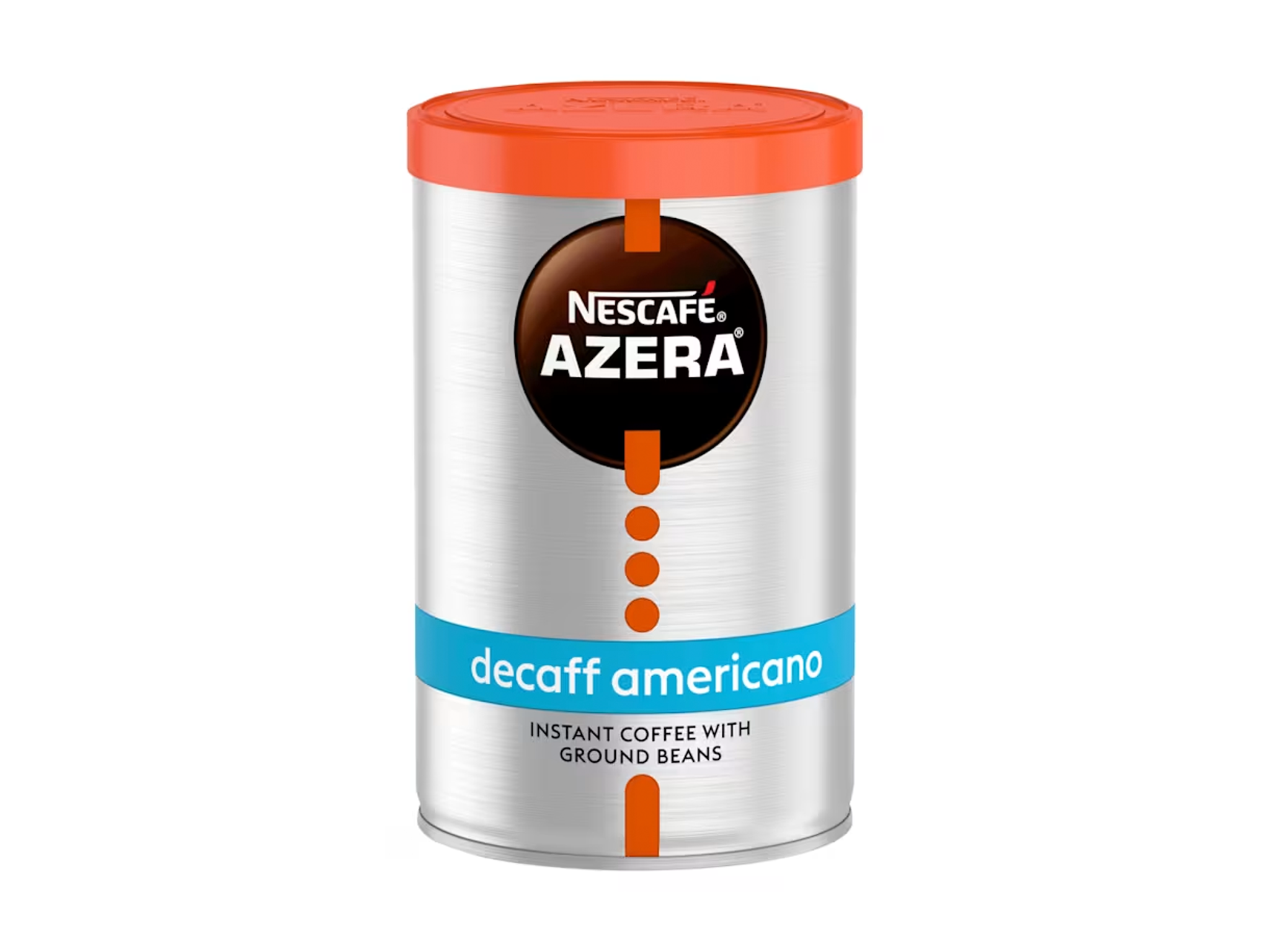
- Best: Instant coffee
- Method: Swiss water
- Origin: N/A
- Why we love it
- No freeze-dry clumps
- Full flavour
- Rich smooth taste
- Take note
- Instant coffee isn’t for everyone
Having scoured the land for an easy-to-make instant decaf coffee that still tastes great, this Nescafe decaf is the best, in our opinion. This is the perfect gift for pregnant people and new mums as it’s so easy to make when you’re in a rush. The coffee is a powder rather than granules, which means you don’t get those nasty floaters and the taste is excellent – full bodied without any bitterness. We’d advise not pouring boiling water directly over the powder, but apart from that it makes an easy, tasty decaf coffee.
Fortnum & Mason anytime blend decaffeinated ground coffee
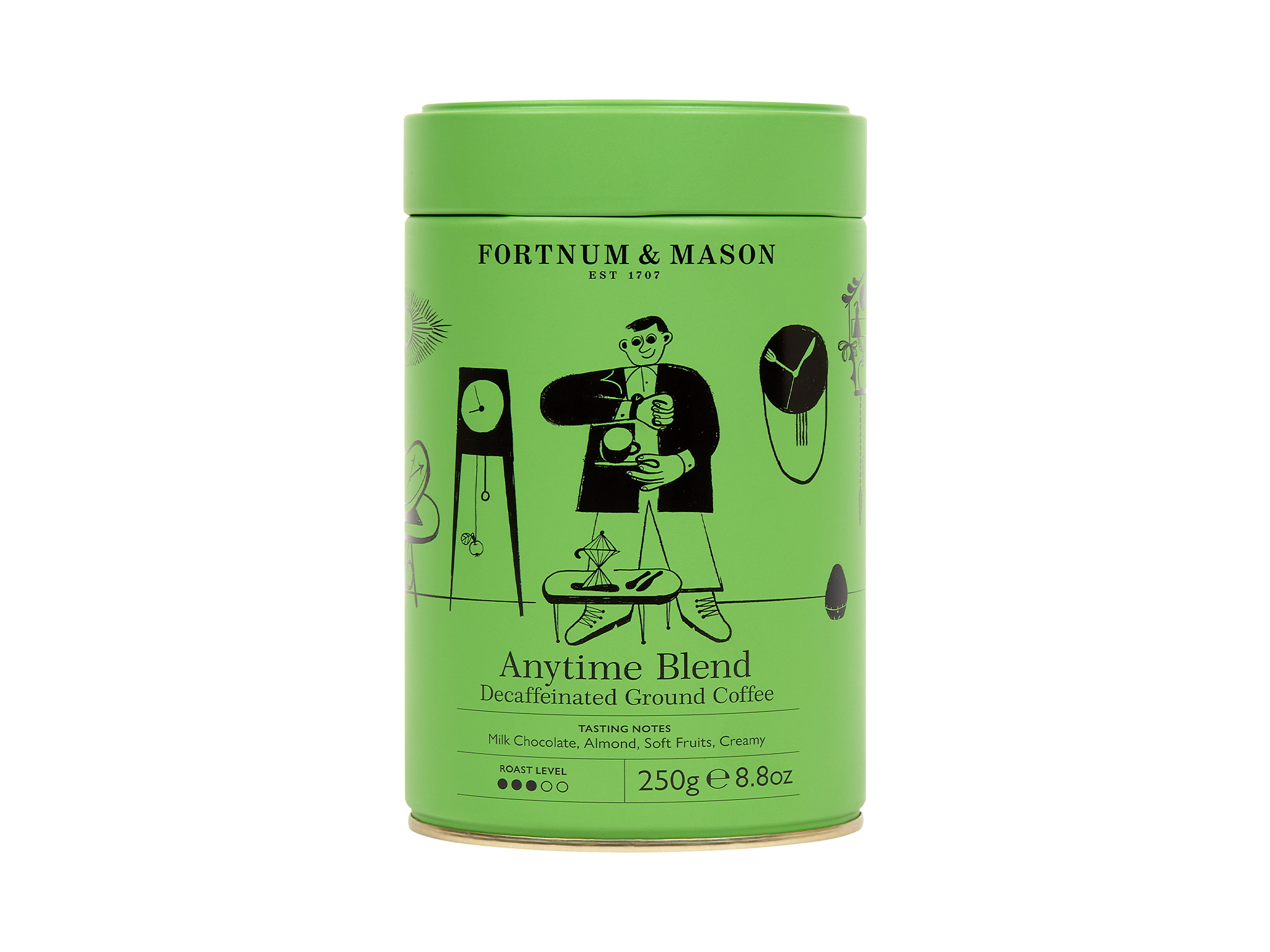
- Best: For afternoon coffees
- Method: Swiss water
- Origin: Honduras and Peru
- Why we love it
- Easy to drink
- Comes in a cute tin
- Great for milky coffee lovers
- Take note
- Can’t use in a bean-to-cup machine
- Bit more expensive
We liked the gentle roast on this anytime blend from premium department store, Fortnum & Mason. It’s a soft, chocolatey flavour that we found worked well in a delicious milky coffee during our 3pm slump – and we can drink it at that time as it’s decaf, after all. It comes in a cute Fortnum’s tin, and is ground for cafetieres, filters and percolators – so nothing fancy is required here, really.
Calm Coffee Roastery decaf colombia el vergel
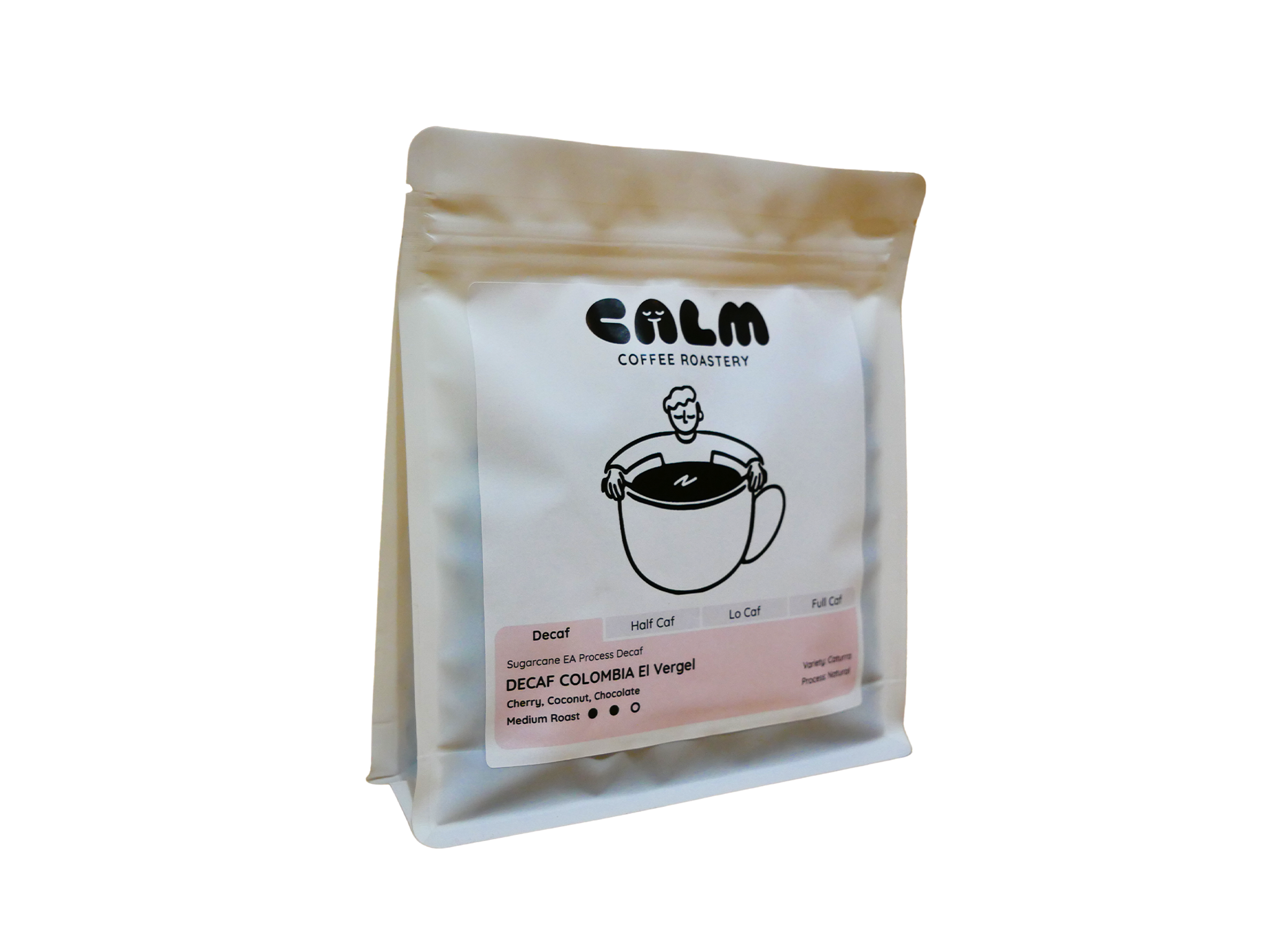
- Best: For a fruity flavour
- Method: Sugarcane
- Origin: Colombia
- Why we love it
- Single-origin coffee
- Great for big coffee fans
Calm Coffee specialises in coffees for “the caffeine conscious” – we love that phrase. It feels like a lot of love and thought has gone into this medium-roast coffee. It’s nice to find that decaf isn’t just an afterthought for a brand, that they really want to make a decent decaf to be enjoyed rather than suffered. And they’ve succeeded with this fruity, bold coffee that felt like it had all of the body of coffee without the head rush from the caffeine. Big coffee lovers who are cutting down their caffeine intake are going to love this one.
200º Coffee mellowship slinky decaf
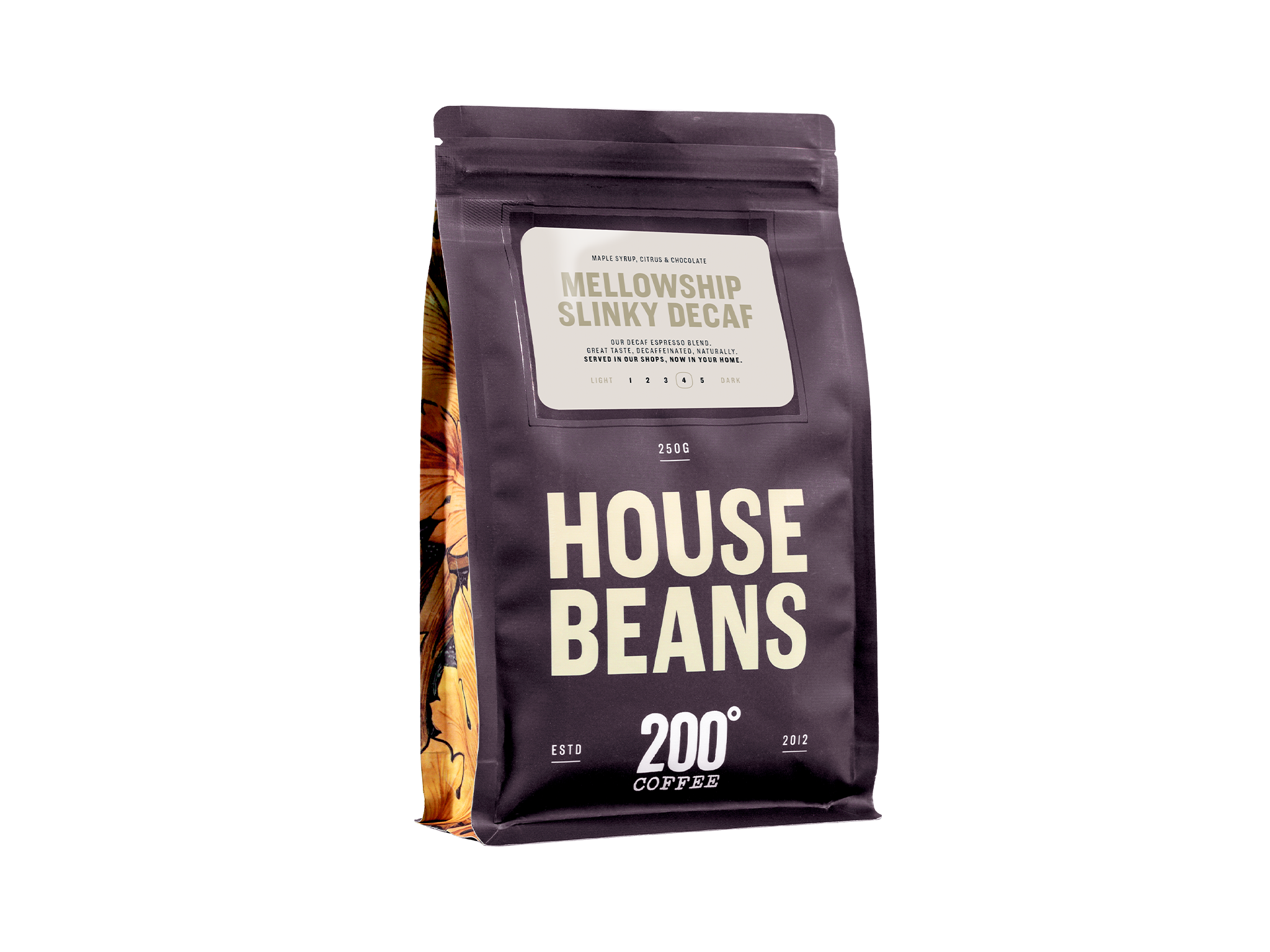
- Best: Dark roast
- Method: Sugarcane
- Origin: Brazil
- Why we love it
- Great value
- Full-bodied coffee
- Great for big coffee fans
- Take note
- Deeper roast not for everyone
On the darker side of the roasting spectrum, the 200 Degrees Coffee decaf manages to not tip over into bitter – perhaps thanks to the sugarcane decaffeination method the brand opts for. It’s definitely a punch of coffee though – full bodied with plenty of zing, its tasting notes are maple syrup, citrus and chocolate. You can get your beans ground the way you want them at 200 Degrees coffee, which is good news for coffee nerds. And we were amazed by the value for money, and had to check several times that the price was right.
Nespresso ristretto decaffeinato
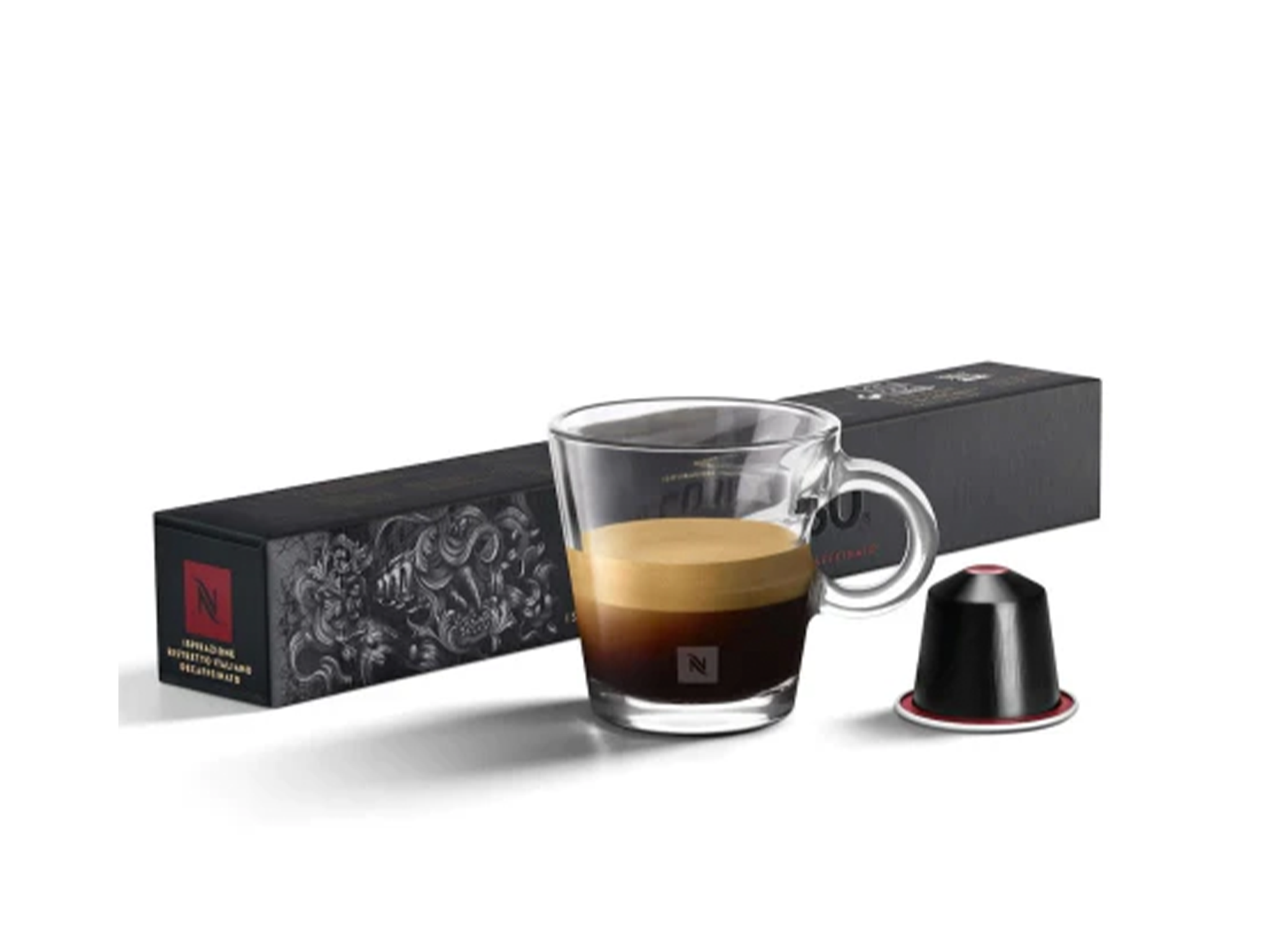
- Best: Coffee pod
- Method: N/A
- Origin: N/A
- Why we love it
- Great
- Speedy option
- Take note
- Only suitable for those with a pod machine
For those with a pod machine, these Nespresso ristretto decaf pods are a solid option. They’re a darker roast – Nepsresso rates them a 10 on their 1-13 scale of intensity. And you definitely get a shot of coffee flavour with these little pods. During testing, some of our reported that the taste could veer into being too bitter, so we found them great – a splash of milk balanced it out perfectly for us.
The verdict: Decaf coffee
For the second year in a row, Rave Coffee takes the top spot for best decaf coffee. We found the Swiss water decaf no. 11 offered the perfect balance, with no compromise on quality or taste despite being decaf. Honourable mentions go to Tunbridge Wells Coffee Roastery and Calm Coffee – these smaller indie roasters have given care and consideration to their decaf products and it really shows in the finished product – tasty and carefully sourced coffee.
We’ve tried and tested the best bean-to-cup coffee machines for perfecting barista-style java at home
Voucher Codes






